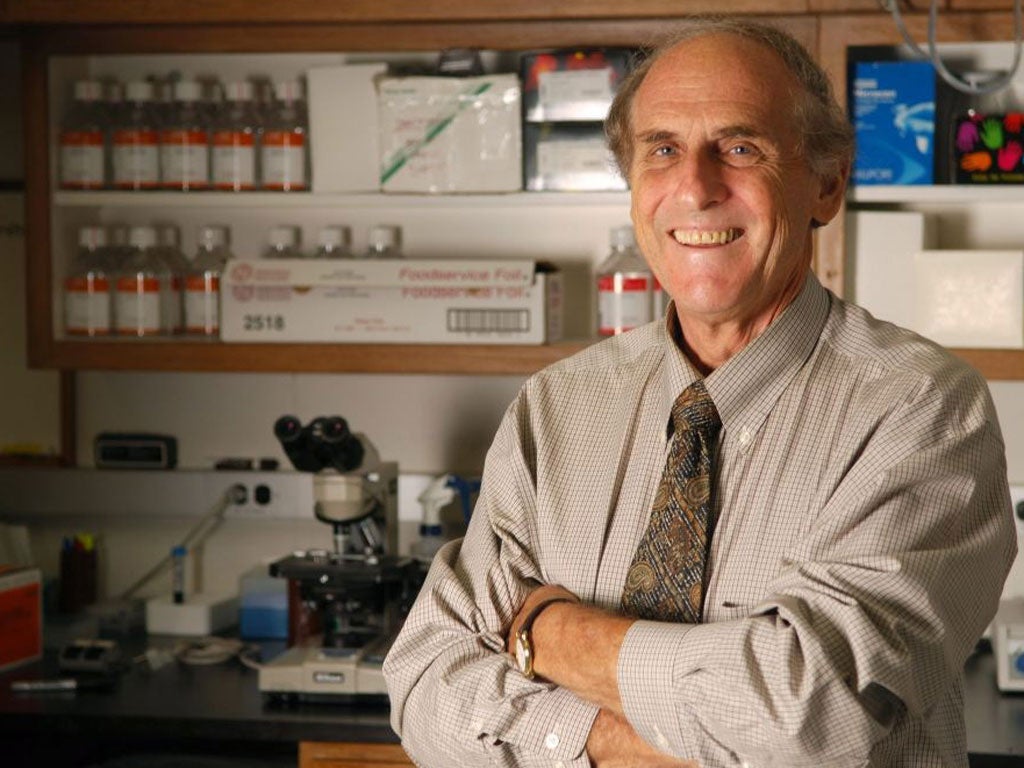Your support helps us to tell the story
From reproductive rights to climate change to Big Tech, The Independent is on the ground when the story is developing. Whether it's investigating the financials of Elon Musk's pro-Trump PAC or producing our latest documentary, 'The A Word', which shines a light on the American women fighting for reproductive rights, we know how important it is to parse out the facts from the messaging.
At such a critical moment in US history, we need reporters on the ground. Your donation allows us to keep sending journalists to speak to both sides of the story.
The Independent is trusted by Americans across the entire political spectrum. And unlike many other quality news outlets, we choose not to lock Americans out of our reporting and analysis with paywalls. We believe quality journalism should be available to everyone, paid for by those who can afford it.
Your support makes all the difference.Ralph Steinman, who has died of pancreatic cancer, was unaware that he was about to become a Nobel Prize-winner. Although Nobel Prizes are not awarded posthumously, the Prize committee said yesterday that there would be no replacement named, and were due to rule on whether or not Steinman will receive the award. Swedish officials were rushing to try to clarify what secretary-general Goran Hansson called "a unique situation".
Steinman, who was 68, was due to share the Nobel Prize for Medicine with Bruce Beutler and Jules Hoffmann for revolutionising understanding of the immune system by discovering key principles for its activation. Steinman had been treating himself with a ground-breaking therapy based on his own research. Dr Vinay Kumar, chairman of the department of pathology at the University of Chicago, who knew Steinman and knows Beutler, said the discoveries by the three have a very broad impact: "These findings are the intellectual foundation of how to design a good vaccine."
Steinman's discovery dates back to 1973, when he found a new cell type, the dendritic cell, which has a unique capacity to activate so-called T-cells. Those cells have a key role in adaptive immunity, when antibodies and killer cells fight infections. They also develop a memory that helps the immune system mobilise its defences next time it comes under a similar attack.
Ralph Marvin Steinman was born in Montreal in 1943. He received his Bachelor of Science degree from Montreal's McGill University after studying biology and chemistry and received his MD – magna cum laude – from Harvard Medical School in 1968. He completed his internship and residency at Massachusetts General Hospital.
From there Steinman joined the Rockefeller University in Manhattan in 1970 as a postdoctoral fellow in their laboratory of Cellular Physiology and Immunology. He became the Henry G Kunkel Professor of Immunology in 1988, and was also director of the Rockefeller's Centre for Immunology and Immune Diseases as well as a senior physician at the university's hospital.
Among his numerous awards and honours were the Albert Lasker Basic Medical Research Award, the Mayor of New York's Award for Excellence in Science and Technology and the Cancer Research Institute's William B Coley Award. He was editor of the Journal of Experimental Medicine and advisory editor of Human Immunology, the Journal of Clinical Immunology, the Journal of Immunological Methods and the Proceedings of the National Academy of Sciences.
Steinman's work, explained how, if required, dendritic cells kill off infections that break through. Understanding dendritic cells led to the launch of the first therapeutic cancer vaccine last year, Dendreon's Provenge, which treats men with advanced prostate cancer. His early research, done with the late Zanvil A Cohn at Rockefeller, began as an attempt to understand the primary white cells of the immune system – the large "eating" macrophages, and the lymphocytes, which operate in various ways to spot, apprehend and destroy infectious micro-organisms and tumour cells.
Steinman and Cohn discovered a previously unknown class of immune cells, which they called dendritic cells, which are found where antigens are most likely to enter the body – the skin, for example, and the mucous membranes of the nose, lungs and intestines. This small but powerful group of cells act as sentinels: as soon as they detect antigens, they destroy them and show the broken fragments to other cells, which recognise them for what they are and spring into action.
Steinman's subsequent research pointed to dendritic cells as crucial to several immune responses, including graft rejection, resistance to tumours, autoimmune diseases and infections including Aids.
Ralph Marvin Steinman, immunologist and cell biologist: born Montreal, Canada 14 January 1943; married Claudia Hoeffel (three children); died 30 September 2011.

Join our commenting forum
Join thought-provoking conversations, follow other Independent readers and see their replies
Comments